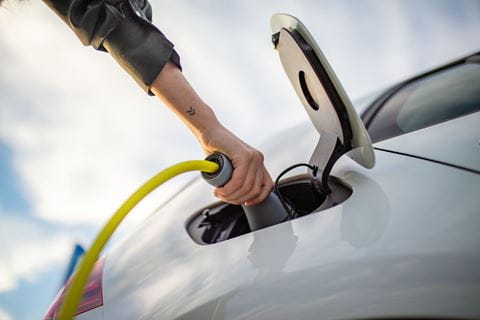
Electrify your corporate fleet
Why electrify your fleet?
The answer is simple: internal combustion engine (ICE) vehicles are responsible for a significant portion of global greenhouse gas (GHG) emissions. Urgent reduction of these emissions is crucial to avoid the worst consequences of climate change. With 50% of vehicles currently on the road registered by companies, companies have a major role to play.
But electrification isn't just an opportunity to reduce your company's environmental footprint (and keep your employees happy). It's also a way to improve cost efficiency through a decrease in total cost of ownership (TCO; see below) and provide employees with an improved, more tech-savvy driving experience.
At the same time, many companies are recognizing not only the benefits of going electric, but also the need to do so. In the face of increased regulatory pressure from governments and other authorities, and higher sustainability requirements in commercial tenders, opting for electric is an essential requirement for business continuity.
For Ayvens, the question is not why to go electric, but when. And the answer is now.
We can actively support your transition to an electric fleet with a 5-step approach:
- Diagnosis
In the first phase of fleet electrification, Ayvens' consultants help customers benchmark themselves against their peers, assess country and employee readiness, establish CO2 and TCO benchmarks, and set achievable targets. These steps are crucial for a successful transition to an electric fleet, tailored to our customers' specific goals.
- Model TCO and CO2 scenarios
Working with you, we will create TCO and CO2 models and scenarios tailored to your fleet strategy.
- Selecting the best mobility solutions
Optimising fleet costs, selecting the right vehicles and brands, exploring multimodal mobility options, and tailoring charging solutions to your fleets are all crucial aspects at this stage.
- Involve your stakeholders and employees
Working with you, we will help you engage your stakeholders and employees to strengthen your transition by providing materials for employee training and internal workshops.
- Implement, Control, and Optimize
Updating mobility policies, introducing reporting capabilities to track TCO and CO2 changes, measuring employee satisfaction and more are included in the final stage of the transition plan.
Supporting your drivers in the process of change
Are your drivers EV-averse or eager to accelerate electrically? In all cases, fleet managers must ensure that employees are motivated and trained to make the transition safely and efficiently. It's also important that they can easily find answers to their questions – from the best EV driving behaviors and how to make sure they always have enough charge, to the ability to use their EV to go on vacation.
In addition, choosing the right EVs for your employees is key to building a community of enthusiastic EV drivers within the company. These 'ambassadors' will in turn be more likely to encourage their colleagues to join the movement towards zero-emission mobility.
Our experiences with our own fleet electrification program and those of our many EV customers make Ayvens the ideal partner for fleet managers. We can provide many tips and tricks to make the transition as smooth and positive as possible.
Read on to find out how to get your employees involved in the fleet electrification journey.
Should your company fleet go electric?
When it comes to making this big decision, there are three major factors to consider:
- Journeys
Can your employees easily commute from home to work? Or do some have to travel longer distances to commute or to reach their customers?
- Charging options
Is it possible for your employees to charge their vehicles at home? Or will they have to rely on public charging stations or office charging points?
- Models
Do any of your employees need specific vehicles when using it outside of work (such as a large trunk or space for all the kids)?
An Ecological Scorecard to facilitate the understanding of TCO and CO2
Balancing sustainability and cost savings in fleet management can be challenging. That's where the Ecological Scorecard comes in. This map is a workshop that helps you make smart choices for your fleet that will optimize your total fleet cost and reduce your CO2 footprint.
We look at things like your company's environmental goals, the types of vehicles used (such as passenger cars and light commercial vehicles), tax rules, and your drivers' fuel consumption in the real world. What makes the Eco Scorecard special is that it does all the hard work automatically, so you don't have to.
With the Eco Scorecard, you can:
- Find out how much it costs to run your fleet and how much CO2 your vehicles produce (actual emissions vs. manufacturers' estimates).
- Make decisions about different fuels and charging options.
- Choose the best vehicles for your needs.
- Show your drivers what's in it for them.
In short, the Eco Scorecard helps you make eco-friendly choices for your fleet without breaking your budget. Find out more about the Eco Scorecard.

Expertise on the transition to electric van fleets
Light commercial vehicle (LCV) fleets have different electrification needs than passenger car fleets – but at Ayvens, we don't think the process has to be more complicated. We always take care to understand the specific needs of your business, ensuring a smooth transition to electric LCVs for your commercial fleet.

Customer Case Studies
Ayvens has helped countless local and international customers in their transition to fleet electrification.
This allows our experts to provide you with elements of comparison and trends, so that you can make the right choice.
Contact our experts to learn more.

